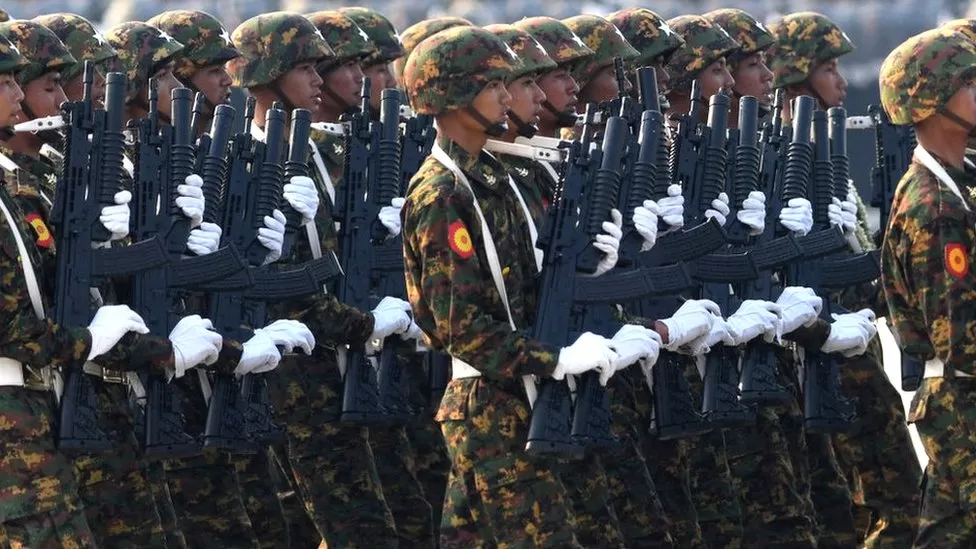A turning point in Myanmar as army suffers big losses

The military-installed president of Myanmar has warned that the country is in danger of breaking apart if the government cannot control fighting which has broken out in Shan State.
(BBC) The military-installed president of Myanmar has warned that the country is in danger of breaking apart if the government cannot control fighting which has broken out in Shan State.
Former General Myint Swe, who was appointed after a coup in 2021, was speaking at an emergency meeting held by the ruling military council to address a series of co-ordinated attacks by anti-military insurgents which have inflicted serious losses on the armed forces.
Three ethnic insurgent armies in Shan State, supported by other armed groups opposing the government, have overrun dozens of military posts, and captured border crossings and the roads carrying most of the overland trade with China.
It is the most serious setback suffered by the junta since it seized power in February 2021. After two-and-half years of battling the armed uprising it provoked with its disastrous coup, the military is looking weak, and possibly beatable.
The government has responded with airstrikes and artillery bombardments, forcing thousands of people to leave their homes. But it has been unable to bring in reinforcements or recover the ground it has lost. Among hundreds of troops killed is believed to be the commander of government forces in northern Shan State, Brigadier General Aung Kyaw Lwin, the most senior officer killed in combat since the coup.
What makes this attack even more significant is that it marks the first time that the well-armed insurgents operating in Shan State have explicitly aligned themselves and their military operations with the wider campaign to overthrow the junta and restore democratic rule.
However, there are other factors at play. These three insurgent groups have long-held ambitions to expand the territory they hold. And crucially China, which normally acts as a restraining influence on all the groups along its border with Myanmar, has not prevented this operation from going ahead.
That is probably because of its frustration over the military government's inaction over the scam centres which have proliferated in Shan State. Thousands of Chinese citizens and other foreigners have been forced to work in these scam centres. The insurgents say one of their aims is to close them
Back in 2021, when peaceful protests against the coup were violently crushed by the military and police, opposition activists decided they had no choice but to call for a nationwide armed uprising against the junta.
Many fled to areas controlled by ethnic insurgents along Myanmar's borders with Thailand, China and India, where they hoped to get access to the training and weapons most of them lacked.
Some well-established ethnic armies, like the Karen, the Kachin, the Karenni and Chin, decided to ally themselves with the National Unity Government (NUG), which was set up by the elected administration that was deposed by the coup.
'We wish we could go back': Life in a war-torn Myanmar
Devastation from the air in Myanmar's brutal civil war
Others did not, notably the various groups in Shan State, a huge, lawless region bordering Thailand and China.
Perhaps best known as one of the world's biggest producers of illicit narcotics, Shan State has also recently begun hosting a booming business in casinos and scam centres.
It has been blighted by conflict and poverty since Myanmar's independence in 1948, fragmented into the fiefdoms of different warlords, drug bosses or ethnic rebels who have been fighting each other and the army.
Two rival insurgent forces claim to represent the Shan, the largest ethnic group, but in recent years four smaller ethnic groups have built up powerful armies.
The strongest of all of them are the Wa, with sophisticated modern weapons and around 20,000 troops backed by China.
Then there are the Kokang, an ethnically Chinese group with a long tradition of insurgency; the Palaung, or Ta'ang, people of remote hilltop villages whose army has grown rapidly since its formation in 2009; and the Rakhine, who are actually from Rakhine State on the other side of Myanmar. But they have a large migrant population in the east of the country which helped establish the Arakan Army, now one of the best-equipped forces in Myanmar.
The Wa agreed a ceasefire with the Myanmar military back in 1989, and have generally avoided armed clashes. They say they are neutral in the conflict between the junta and the opposition. But they are presumed to be the source of many of the weapons heading to the anti-military resistance groups in the rest of the country.
The other three ethnic armies - the Kokang MNDAA, the Ta'ang TNLA and the Arakan Army - have formed themselves into what they call the Brotherhood Alliance. They have all clashed repeatedly with the military since the coup, but always over their own territorial interests, not in support of the NUG.
These three insurgent groups have discreetly given sanctuary, military training and some weapons to dissidents from other parts of Myanmar.
But, situated as they are on the Chinese border, they have also had to consider China's concerns, which are to keep the border stable and trade flowing. China has been giving diplomatic support to the junta and kept its distance from the NUG.